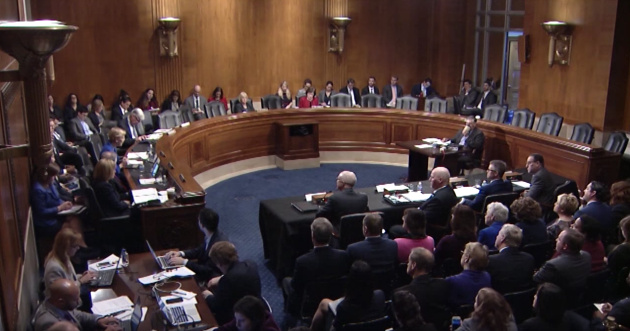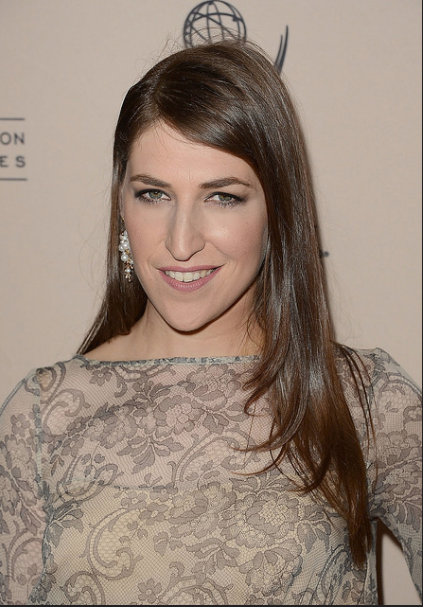Author Archives: Rebecca Krevat
June 27, 2018 by Rebecca Krevat
Why We’re Protesting the Orthodox Union Every Monday
 Keeping Kashrut, or kosher, is one of the most central and recognizable pillars of observant Judaism. As a child in a traditional but modern Orthodox community, I was taught the importance of keeping kosher. Even when I was a toddler, I asked my Orthodox uncle if his house was kosher before feeling comfortable eating there. For our family, food products needed kosher symbols. At the grocery store, families like ours all across the country scan products for the “OU” symbol from the Orthodox Union—one of the most widely recognized and trustworthy of the kosher symbols.
Keeping Kashrut, or kosher, is one of the most central and recognizable pillars of observant Judaism. As a child in a traditional but modern Orthodox community, I was taught the importance of keeping kosher. Even when I was a toddler, I asked my Orthodox uncle if his house was kosher before feeling comfortable eating there. For our family, food products needed kosher symbols. At the grocery store, families like ours all across the country scan products for the “OU” symbol from the Orthodox Union—one of the most widely recognized and trustworthy of the kosher symbols.
The Orthodox Union is an umbrella organization representing Orthodox synagogues and communities across the United States. In addition to telling the community what foods are permissible to eat, the OU runs programs that keeps the organization deeply rooted in Orthodox communities, including youth groups and support on campus. The OU is a significant component of the blood in the veins of the Orthodox communal world.
I didn’t even realize the OU did any political work outside of their communal support until 2014, when I noticed that they had commended the Supreme Court’s decision siding with Hobby Lobby in a notorious case regarding an employer’s responsibility to provide insurance inclusive of contraception, as mandated by the Affordable Care Act. They sided with the evangelical Christian plaintiffs in that case, even though President Obama had already ensured that any company that was not comfortable paying for contraception could employ a provision so the government would pay for it instead.
- No Comments
February 7, 2018 by Rebecca Krevat
Backing Marcus Harms Students and Survivors—And Citing His Anti-BDS Views Doesn’t Make That Okay

The confirmation hearing of Kenneth Marcus.
In this video, Elizabeth Warren asks Kenneth Marcus—Trump’s choice to lead the Department of Education’s Office of Civil Rights and president of the Louis D. Brandeis Center for Human Rights Under Law—a few scenario-based questions during his hearing. If there was a school district where some schools had mostly white students and some schools had mostly black students, and the schools with mostly white students had better teachers, more Advanced Placement offerings and resources, would that be considered discrimination? Marcus responded tepidly by dancing around the very clear violation of black students’ civil rights. All he would say was that if he were confirmed he would “review the facts” of the case to see if it were a violation of Title VI, which prohibits discrimination on the basis of race. This question wasn’t a hypothetical. It’s a real-life example from Toledo, Ohio.
It gets worse. Marcus agrees with Betsy DeVos’s dangerous choice to rescind the 2011 Dear Colleague Letter (DCL), written to explain how schools should be supporting students after an assault occurs, under the false pretense that the DCL preferences survivors over accused students. Without the DCL, both survivors and accused students are now at risk in an environment where a person like Larry Nassar was able to abuse over 250 young women because Michigan State refused to step in. How many of these women would have been spared had MSU followed their Title IX obligations properly when they received their first complaint about him in 2014? (Specifically in this case, if they had been wary of potential conflicts of interest that may arise during internal investigations.)
It is heartening to see Jewish organizations like NCJW and JWI oppose Marcus’s nomination. But not all are. Which asks the question: How could any Jewish organization, especially ones that believe in civil rights and safety for all students, approve of a person who seems to have little investment in protecting students’ civil rights?
You will find the answer in perhaps the most divisive subject amongst our people—Israel. Organizations like Hillel International are supporting the confirmation of Marcus because he includes criticism of Israel and BDS in his definition of anti-Semitism.
- 1 Comment
January 24, 2018 by Rebecca Krevat
JWFNY To Host #MeToo Town Hall; Work Toward Creating Code of Conduct
I always knew the time would come for the Jewish communal world to face the sexual assault and harassment that pervades it. That time is now. I wish it wouldn’t have taken this seismic #MeToo movement/moment for us to get on board in fixing a problem that has persisted in our peoplehood since biblical times, but those who abuse power do not let go of it easily, especially without institutions that stand unwaveringly behind victims and survivors. This is a large part of why it’s so exciting that the Jewish Women’s Foundation of New York (JWFNY) is hosting a town hall meeting this week titled, “Revealing metoo as wetoo in Jewish Communal Life,” to specifically address “gender abuse and harassment in the Jewish community.”
The language used to describe the event already cued me to the fact that the organizers care deeply about those who are most affected. I spoke to JWFNY executive director Jamie Allen Black who told me that she specifically chose the phrase “gender abuse and harassment” as opposed to “sexual harassment” because as she described, “it’s not about sex but about power and demeaning—for me that’s a big message and now seemed like the right time because people are actually listening.”
In fact, JWFNY has been working to address this problem well before the Weinstein allegations came to light. Starting in the summer of 2016, JWFNY began holding trainings to combat harassment and gender abuse for professionals in Jewish organizations, improving their model overtime.
In early December of 2017, Black was approached with the idea that JWFNY hold a town hall meeting on the topic for the Jewish communal world, like those hosted by the Royal Court Theater in London and the Public Theater in New York. The idea would be for individuals to share survivor stories before communally establishing a code of conduct.
- No Comments
November 28, 2017 by Rebecca Krevat
Feeling Alive Within Jewish Rituals

Photo credit: Inna Shnayder
We should be playing more.
This is the formative idea behind the Well of Wills Ritual Lab. Hannah Roodman, an artist and experience designer from Richmond, Virginia developed the concept of the Well of Wills, “intimate and immersive experiences designed to help boost creativity and strengthen self-trust.” Last December I journeyed with Hannah for the first Well of Wills retreat, where 30 Jewish women spent a weekend in the Hudson Valley for workshops to explore the concept of divine Jewish femininity, and empower ourselves through creativity. We were divided into groups, and by the end of the weekend each group had created a unique performance piece on topics ranging from vanity to jealousy. We also participated in a photo series considering our past, present and future selves, ate wholesome and delicious food, danced and connected with each other. It was pure magic.
When Hannah invited me to join the next installment of the Well of Wills series, a day of experiences designed to “explore how personal and co-created prayer and ritual can impact change in our daily lives,” I jumped on the opportunity to play some more.
- No Comments
October 17, 2017 by Rebecca Krevat
Stop Victim Blaming: A Response to Mayim Bialik from One Member of the Orthodox Community to Another

Photo credit: Jason Merritt
On October 13th, the actress Mayim Bialik wrote an op-ed titled, “Being a Feminist in Harvey Weinstein’s World” about the ways in which she feels that her non-traditional Hollywood appearance, and her “modest” behavior has kept her safe from advances by men like Harvey Weinstein. She wrote, “I still make choices every day as a 41-year-old actress that I think of as self-protecting and wise. I have decided that my sexual self is best reserved for private situations with those I am most intimate with. I dress modestly. I don’t act flirtatiously with men as a policy.” It’s baffling that someone like Bialik would take a stance like this as a feminist, to put the burden of preventing an assault on the person being assaulted, and not the assaulter. Let’s be clear: this op-ed is the definition of victim blaming. In Bialik’s world, it’s not Harvey Weinstein’s fault for pressing forward as the women said no, but the women themselves for being too conventionally beautiful, wearing too much make-up, or pair of tight jeans. Weinstein’s victims were “asking for it.”
I am also surprised to hear this take from Bialik for another reason—because she is an Orthodox Jew. As such, Bialik should know that sexual assault happens in our community, where many individuals take great care to act and dress according to her definitions of “modesty.” I once had a camp counselor who hesitated to buy a pair of burgundy shoes because they could be misconstrued as immodest. According to Bialik’s philosophy, this careful attention to modesty should equate to a zero percent rate of sexual harassment and violence in the Orthodox community. Sadly, we all know that this isn’t the case.
- 4 Comments
September 12, 2017 by Rebecca Krevat
Defying DeVos

Last Thursday, Betsy DeVos stated that she would rewrite the 2011 Dear Colleague Letter (DCL), a powerful document directed to K-12 and university administrations that clarified schools’ obligations under Title IX (a federal civil rights law) to combat sexual violence and to support survivors. In announcing her decision, DeVos claimed that the original Dear Colleague Letter – and federal enforcement of Title IX – did everyone a disservice.
DeVos’s justifications for dismantling Title IX protections couldn’t be further from the truth.
Before the Obama Administration took sexual violence seriously and enforced Title IX, schools were able to get away with mistreating student survivors. The stories of institutional abuses are horrific. One university told a student that she should work at Starbucks until her rapist graduated. Another student was told by an administrator that “rape is like a football game, if you look back on the game and you’re the quarterback, is there anything that you would have done differently?” Another university refused to take action while fraternity members marched around the freshman halls chanting, “No means yes, yes means anal.” Other survivors of sexual violence were forced to drop out when their school failed to address the violence, apparently because they did not know Title IX existed.
- No Comments
April 21, 2017 by Rebecca Krevat
How Rape Survivors Are Using Art
April is Sexual Assault Awareness Month. As a survivor and survivor advocate, I struggle during this time with the way media portrays us. While individual stories of survival and victimhood are critical, far too often some of us feel boxed in by what we call the “sad rape girl” narrative. This is what happens when journalists reduce survivors down to their narratives of victimhood, of loss of control, of lack of agency, and refuse to let us share how we’re fighting back, of how we’re experts in law or advocacy around sexual violence.
This is part of why I was so interested in attending the recent public conversation “Consent/Dissent,” between by Emma Sulkowicz and Aliza Shvarts, two artists who challenged the status quo of survivor and victim narratives through performance art.
Emma Sulkowicz is best known for her “Mattress Performance” held at Columbia University. She carried her dorm mattress around with her each day her rapist still attended the University. During this time, Emma noticed that suddenly everyone was an expert about her rape—that everyone had all these ideas about what rape survivors would and would not do. Emma was provoked by these commentaries to do something that a “real” rape survivor would never, ever do – in “Ceci N’Est Pas Un Viol” (2015; “This Is Not a Rape”) she recreated her rape experience on camera as a performance piece.
- No Comments
 Please wait...
Please wait...